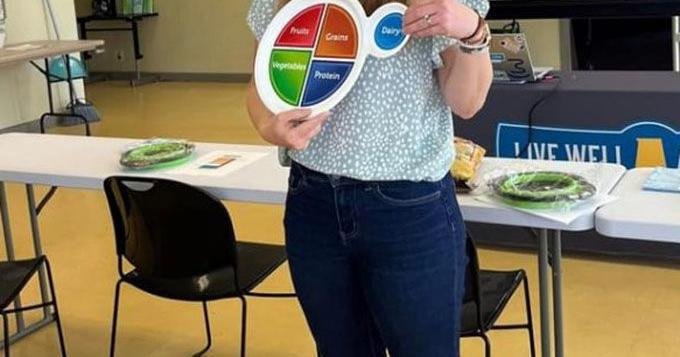Nutrition education is a priority for the Alabama Supplemental Nutrition Assistance Program – Education team. Educators took to the stage to share some of their success stories working with state residents.
The event, “MyPlate Nutrition Security Success Stories: Sharing the Best Community Work,” focused on the successes surrounding the USDA’s MyPlate tool. The gathering also provided an opportunity to discuss the nutritional needs of different communities.
At this event, SNAP-Ed Coordinator Katie Funderburk and Regional Extension Agents Michelle Paquette and Kristen Sanders discussed the success of using MyPlate and its impact on nutrition education in Alabama.
The session, moderated by Carrie Cottright, Director of Nutrition Security and Equity at the USDA Food and Nutrition Service, discussed the impact of nutrition education. Paquette and Sanders highlighted strategies they use to help people learn to eat healthier. Their work shows how these ideas can lead to lasting improvements in community health.
“We drew inspiration from the many stories shared by nutrition educators from across the Southeastern United States,” Funderburk said. “We were honored to be invited to share real-life stories about SNAP-Ed’s positive impact in Alabama communities on a national stage.”
What is MyPlate?
MyPlate was introduced by the USDA in 2011, replacing the Food Guide Pyramid, and provides a simple approach to healthy eating. This is a model that educators use to teach people how to incorporate a variety of healthy foods into their daily diet. MyPlate allows individuals to plan meals to fit their specific dietary needs, preferences, cultural traditions, and budget.
If you cook it they will come
Sanders has seen success using MyPlate in Crenshaw and Pike counties. Mr. Sanders developed his four-week series called “My Plate for My Family Cooking Night” using the “My Plate for My Family” curriculum. In this program, you will learn the basics of food safety and cooking, and the importance of a nutritious diet. Hands-on classes allow participants to plan meals and prepare dishes using healthy, budget-friendly ingredients.
“The goal was not only to teach families how to cook, but to help them make healthier choices that fit their lives and budgets,” Sanders said.
Participants expressed both surprise and delight at their new cooking skills and the ease with which they could create delicious and healthy meals. Sanders said the feedback has been overwhelmingly positive.
“One parent said she didn’t know it was so easy to make homemade macaroni and cheese,” Sanders said. “Another said their children requested meals multiple times. Other families also participated in a separate family cooking class series.”
Sanders said it’s rewarding to see families come back and be excited to learn and try new recipes.
Expanding nutrition education in the community
Puckett, who serves Barbour and Henry counties, has implemented the MyPlate tool in a variety of community settings to promote healthier eating habits. At a rural grocery store, Puckett uses his MyPlate as a visual aid to educate shoppers on affordable, balanced meals. SNAP-Ed’s Outreach A notable example of her partnership is the introduction of Good Choice Healthy Retail coolers, which stocked the stores with ingredients for Live Well Alabama recipes. These recipes make it easy to prepare and cook your next healthy meal.
In addition to the SNAP shopping experience, Puckett has adapted MyPlate for a culturally diverse audience. This includes offering nutrition classes in Spanish for Hispanic families.
“MyPlate’s visual simplicity helps overcome language barriers and make nutrition universally understandable,” Paquette said.
These classes include interactive activities such as creating MyPlate-inspired meals using food samples with the help of an interpreter. These models helped participants understand meal plans and facilitate nutritional choices. Puckett also strengthened nutrition education at her local food pantry by securing permanent signage for her MyPlate through a High Obesity Program grant from the Centers for Disease Control and Prevention’s Division of Nutrition, Physical Activity, and Obesity. did.
simple and easy to use
MyPlate is a proven tool in many communities that helps individuals and families make healthier food choices. MyPlate has supported initiatives like Sanders’ family cooking classes and Puckett’s in-store education by providing a simple visual guide for creating balanced meals. This tool helps make nutrition education easier to understand and implement in Alabama communities. For more information about MyPlate, visit myplate.gov.
For more information
To learn more about nutrition and physical activity, visit LiveWellAlabama.com for valuable resources, practical advice, and insights to support your health journey.
If you would like to connect with others interested in a healthy lifestyle, please consider following Live Well Alabama on social media. Our Facebook, Twitter, and Instagram platforms provide a space to share experiences, find inspiration, and join a community focused on health.

